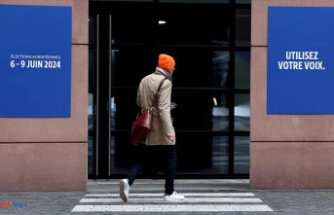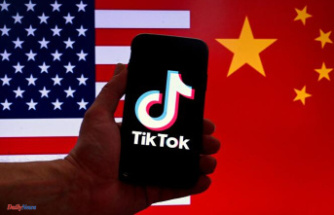Towards a new drug against Covid-19? While therapeutic alternatives are reduced in the face of Omicron, which continues to threaten the most fragile, two Swiss research centers announced on Wednesday the discovery of a new promising antibody against the coronavirus.
P2G3, as it is scientifically named, is said to show "highly potent neutralizing activity against all SARS-COV-2 variants of concern, including Omicron subvariants" in monkeys, when used preventively, if is congratulated the Center Hospitalier Universitaire Vaudois (CHUV) in a press release.
"This discovery therefore opens the way to new therapeutic applications as a drug intended to protect people at risk, in particular immunocompromised", declared the research organization, co-signatory with the Ecole Polythechnique Fédérale de Lausanne of the study backing this discovery, published in the journal Nature Microbiology.
Concretely, P2G3 is a molecule which has the capacity to cling to the "Spike" protein of the virus, which prevents it from infecting the cells of the monkey. And maybe the man. Clinical trials are due to begin in August, according to Heidi News, when most monoclonal antibodies on the market or in development have lost their effectiveness with the appearance of new strains of the coronavirus.
To arrive at these results, the scientists first isolated the antibody from a previously infected and twice vaccinated donor, then injected it into two monkeys before exposing them to SARS-CoV-2, more precisely to a subvariant of Omicron (BA.1). The researchers thus demonstrated "complete protection", acquired thanks to P2G3, where the four monkeys who had not benefited from the treatment fell ill.
The study also demonstrates the effectiveness of P2G3 combined with another broad-spectrum antibody, "P5C3", previously identified by the CHUV and EPFL groups. “This broadly active combination has the potential to be an excellent cocktail of anti-SARS-CoV-2 antibodies against all current variants of SARS-CoV-2,” the CHUV said in a press release.
Promising results, but which remain very preliminary. “They are rather interesting but I fear that they do not offer rapid general therapeutic solutions”, declared to the Express Morgane Bomsel, immunologist at the Cochin Institute and researcher at the CNRS.
Studies should be carried out on the new BA.4 and BA.5 sub-variants of Omicron, which emerged after these experiments. The researchers are hopeful that P2G3 also works on these strains, while only Bebtelovimab, currently reserved for the United States, maintains its effectiveness against these viruses.
“However, this discovery is not intended to replace vaccination, which remains the most effective means of protecting against infection”, specifies the Vaud hospital center. However, an effective treatment could notably relieve the immunocompromised population. Between 50,000 and 300,000 patients would be eligible in France for the prescription of antibodies, but only 20,000 prescription requests had been accepted by mid-May, in particular due to the loss of effectiveness of those on the market.












